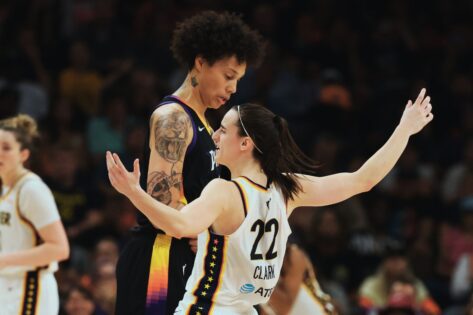

The WNBA is currently navigating a complex intersection of competition, race, and influence, with rookie sensation Caitlin Clark and veteran star Brittney Griner at the center of a developing controversy. The incident, fueled by social media and amplified by conservative media outlets, highlights the challenges facing the league as it grapples with its growing popularity and the heightened scrutiny that comes with it.
The controversy began during a late May game between the Indiana Fever, Clark’s team, and the Atlanta Dream, where Griner now plays. After fouling out of the game, Griner was caught on camera appearing to say something in frustration. While there was no audio, some viewers interpreted her words as a derogatory slur directed at Clark, specifically referencing her race. This interpretation quickly spread online, igniting a firestorm of debate.
Conservative figures and media outlets were quick to condemn Griner, with some even referencing her previous detainment in Russia and the prisoner swap that secured her release. Former NCAA swimmer Riley Gaines, a prominent conservative voice, shared the clip on social media, adding fuel to the outrage. The implication was clear: Griner, already a controversial figure in some circles, had allegedly made a racist remark against Clark, who has become a popular, and to some, a symbolic figure.
However, others have disputed this interpretation of the video. Some analysts and fans believe that Griner was actually expressing her frustration with the officiating, saying "f***ing wack call" rather than directing a slur at Clark. Jemele Hill, a journalist and commentator, supported this alternate interpretation, further complicating the narrative.
Adding another layer to the controversy, Brittney Griner herself has denied making any such comments. In an interview, she stated firmly that she "would never say that" and that there is "no place for that in our league." She admitted to being angry about the foul call that led to her ejection but insisted that she would not use that type of language.
Regardless of Griner's intent, the incident underscores the racial dynamics at play within the WNBA and the broader sports landscape. Clark's arrival in the league has brought unprecedented attention and viewership, a phenomenon dubbed the "Caitlin Clark effect". While this increased visibility is undoubtedly positive for the WNBA, it has also raised questions about race, privilege, and the distribution of opportunities within the league.
Meanwhile, the Atlanta Dream's position adds another layer of intrigue. As a team, they have a direct impact on the Fever's success and playoff chances, making every game between the two teams highly competitive and closely watched. Beyond the specific incident involving Griner and Clark, the Dream's performance against the Fever can either exacerbate or alleviate the tensions surrounding the two stars.
It's important to note that Clark herself has been breaking records and achieving historic milestones. She became the first WNBA player to tally over 100 points, 30 assists, and 30 rebounds in her first five games. Her performance, combined with the controversies, ensures that all eyes remain fixed on her and the WNBA.
The Caitlin Clark-Brittney Griner situation reflects the complex realities of race, fame, and competition in professional sports. As the WNBA continues to grow and evolve, it will be crucial for the league, its players, and its fans to engage in open and honest dialogue about these issues. Only through understanding and empathy can the WNBA navigate these challenges and create a more inclusive and equitable environment for all.